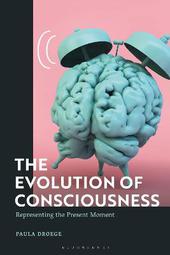
|
The Evolution of Consciousness: Representing the Present Moment
Hardback
Main Details
| Title |
The Evolution of Consciousness: Representing the Present Moment
|
| Authors and Contributors |
By (author) Professor Paula Droege
|
| Physical Properties |
| Format:Hardback | | Pages:256 | | Dimensions(mm): Height 234,Width 156 |
|
| Category/Genre | Philosophy of the mind |
|---|
| ISBN/Barcode |
9781350166783
|
| Classifications | Dewey:153 |
|---|
| Audience | | Professional & Vocational | |
|---|
|
Publishing Details |
| Publisher |
Bloomsbury Publishing PLC
|
| Imprint |
Bloomsbury Academic
|
| Publication Date |
2 December 2021 |
| Publication Country |
United Kingdom
|
Description
The Evolution of Consciousness brings together interdisciplinary insights from philosophy, neuroscience, psychology and cognitive science to explain consciousness in terms of the biological function that grounds it in the physical world. Drawing on the novel analogy of a house of cards, Paula Droege pieces together various conceptual questions and shows how they rest on each other to form a coherent, structured argument. She asserts that the mind is composed of unconscious sensory and cognitive representations, which become conscious when they are selected and coordinated into a representation of the present moment. This temporal representation theory deftly bridges the gap between mind and body by highlighting that physical systems are conscious when they can respond flexibly to actions in the present. With examples from evolution, animal cognition, introspection and the free will debate, this is a compelling and animated account of the possible explanations of consciousness, offering answers to the conceptual question of how consciousness can be considered a cognitive process.
Author Biography
Paula Droege is Teaching Professor in the Philosophy Department at Pennsylvania State University, USA.
ReviewsThis book brings the temporal aspect of consciousness into its proper place as a central philosophical notion connected to all the big questions that make philosophy interesting for non-specialists. It also offers a new way of seeing how it all hangs together in, as Droege points out, the house of cards. * Michal Klincewicz, Assistant Professor, Tilburg University, Cognitive Science and Artificial Intelligence, Netherlands *
|